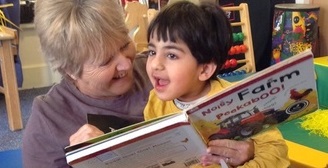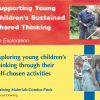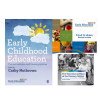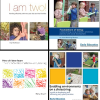Letter to the next Prime Minister
The letter below sets out our key asks for the next government.
Early Education Associate, Debi Keyte-Hartland reflects on a recent commission by Balcarras Teaching School Hub In Gloucestershire to deliver a four-day course on Sustained Shared Thinking.
The aim of this 4-day professional learning course for Balcarras Teaching School Hub is to build educators knowledge and practice through a combination of professional learning mechanisms designed to amplify and recognise opportunities for Sustained Shared Thinking (SST). Day 1 established educators’ prior knowledge of SST and considered credible sources of research that focused on dialogic teaching and collaborative talk to enable rich situations in which to think together with children about their interests, motivations and working theories, such as:
The first day ended with time to plan specific actions to take back to the setting to develop, and then to analyse the impact of those changes made with their team, and to share those findings and evolution of practice across days 2 and 3.
We have just completed day 2, and it was such a rich, inspiring, and informative day in which educators shared and reflected on their ongoing actions. One participant shared how they had developed their school buddy system in which Year 6 children were “trained” in Manor Park Talks (2019) and the ShREC Approach to support their interactions with the nursery and reception children in their weekly Time to Chat sessions. This has had significant impact already reported in how children in the EYFS are talking more with their buddies through improved interactions and mutually sharing their ideas with each other. This has also had unexpected impact on group work and discussion in year 6 through the development of their skills in attuned and attentive listening and their use of more supportive questioning and comments in classroom discussion.
Another impact reported from an educator has led to changes in how their setting developed their planning which now focused more on, and recognised, the agency of the children through letting go of fixed, pre-determined topics. She realised these had meant that educators had become more focused on delivering and covering the content rather than developing and paying attention to the quality of their interactions in developing children’s knowledge and dispositions of learning. They have found through changes made that children are still developing rich seams of knowledge and understanding that link to their curriculum intent, but doing so in a way that attends to the quality of the relationship between teaching and learning, rather than just a focus on teaching and delivering and content. The results of this new approach are already revealing significant improvement:
“The quieter children have responded to us so much more and have become more involved and encouraged to share their thoughts.”
Another educator reflected on their changes made to practice saying:
“Children are bouncing ideas of each other and collaborating, they are remembering more too because the learning is engaging their motivation and interest.”
There have been more actions and thoughts developed amongst this group though this reflection and analysis of changes made to practice, and I am delighted that they are also finding independent ways in which to share practice, ideas, and resources with each other beyond the course meeting times. It feels very much like a developing community of practice, and I look forward to hearing more about their practice-based research and evidenced impact of changes made to develop SST in their settings on day 3.
Participants will join for a final day of evaluation later in the year to draw out and revisit their learning, in which they will produce learning materials that exemplify and describe the impact of the types of interactions, lesson plans and interventions they have tested that were successful in developing and improving SST with their children.

The letter below sets out our key asks for the next government.
Early Education Associate, Caroline Eaton writes about developing bespoke support for childminders for Oldham Borough Council. Since 2021, Early Education has been working alongside Oldham
Guest blog by Frances Giampapa and Claire Lee Introduction A wealth of evidence demonstrates the fundamental role played by early years (EY) education in shaping
by Katherine Gulliver Introduction Early Education was recently asked to review the special educational needs and/or disabilities (SEND) provision in the early years within one
Clare Devlin, Early Education Associate What aspects of physical development should we focus on within the Early Years Foundation Stage (EYFS) and other early years
By Debi Keyte-Hartland, Early Education Associate This article is based on one included in the Early Education Journal no 100. To access the full article
In this article, Kate Irvine from Bristol Early Years discusses the impact of practitioners engaging in a sustained process of CPD through cluster groups and
by Dr Jo Albin-Clark, Edge Hill University and Dr Nathan Archer, Leeds Beckett University Inspection in the news Being involved in education in England involves
What are “Fundamental British Values”? by Vicky Hutchin The so-called “Fundamental British Values” form a part of the Prevent Duty, introduced in 2015 and last
The open letter below was sent to Ofsted in November 2023. Download Ofsted’s response We the undersigned are writing to you about the recently published
Early childhood education today has been influenced by key figures such as Froebel, Montessori, Isaacs and MacMillan. Much recent research has supported their ideas although
Sustained shared thinking: An episode in which two or more individuals “work together” in an intellectual way to solve a problem, clarify a concept, evaluate
Early years pedagogy is the theory that informs the practice of teaching children in the early years. The pedagogical research has been carried out by
by Cathy Gunning What is reflective practice? Reading a book by Donald Schon early on in my career as a teacher opened my eyes to
The Early Career Framework has been designed by the Department for Education in England to support newly qualified teachers in England with a structured package of support
The following extracts from past early years teaching newsletters have a feature which supports your team dialogue around pedagogy and practice dilemmas and reflective practice.
Last updated Spring 2018. The preschools of the Reggio Emilia in Northern Italy inspire us with their pedagogy and practice in giving children rich encounters
In most cases, sound early years principles and practices are already in place in settings. The EYPP funding allows settings to review and refine what
Who was Friedrich Froebel (1782-1852) Born on 21 April 1782 Friedrich Froebel was a German educator who invented the kindergarten. He believed that “play is
This article by Early Education Associate Anni McTavish explores the term “cultural capital”, and what it might mean for early years practitioners and their settings.
Welcome to the e-book Child-Centred Competences for Early Childhood Education and Care. The book brings together four years of research undertaken by early childhood academics
Raymond Williams maintained, after years of examining constructs of culture and society that “Culture is one of the two or three most complicated words in






Early Education
2 Victoria Square
St Albans
AL1 3TF
T: 01727 884925
E: office@early-education.org.uk